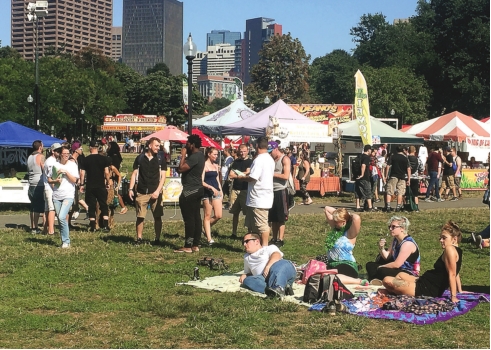
Mayor Michelle Wu has unveiled a master plan to revitalize the Common but implementing the designs will require politicians to win years of sustained budgetary support.
The mayor’s office revealed its new Common Master Plan on October 13, the result of months of public engagement. Input from residents has been refined into a comprehensive infrastructure project focused on improving connective areas and several iconic features whose repair has fallen behind.
Officials are still
seeking public input on the plan’s implementation, and the construction
will require a funding fight in the years to come once its dedicated
budget has been exhausted.
The
project is currently pulling its funding from $28 million the city
reserved for it as part of the sale of the Winthrop Square garage, with
$5 million of that is dedicated to maintenance.
The
design process for the master plan itself took up $700,000. The mayor’s
office itself admits that the remaining funds aren’t enough to pay for
the project, ensuring that the plan will have to win its future through
the conventional city budgeting process.
“With
all of the projects and improvements identified, we acknowledge the $23
million is not enough to achieve all of this. The goal is to leverage
that money throughout the improvements through the capital budgeting
process and other fundraising options to meet the needed financial
requirements for each project's implementation,” city officials said in a
statement.
Liz Vizza, President of the Friends of the Public Garden, concurred.
The
larger dreams of Boston’s city planners will be left almost entirely up
to whether their politicians can argue for the funding in the years to
come.
“We’ve got $23
million for capital projects, and that money can disappear overnight.
You could disappear that money in the drainage and curbing and paths and
never even see a big transformational capital project. There will be
much more funding that will be needed, both private and public, and the
city will be looking at all sources to fund this,” she said.
The
plan touches on essentially every part of the Common, but some of the
most noticeable changes will be the renovation of the frog pond, new
pilot bathrooms and repairs to the Common’s most used pathways.
Officials
have been drafting the plan since June of 2019 in a series of pop-up
exhibitions, open houses and surveys that collected over 10,000
responses.
The Friends
of the Public Garden was also involved in the process despite the plan
not extending to its facilities. Vizza says it’s an opportunity to shore
up the Common’s weaknesses and reinforce strong points that are feeling
their age.
“We heard about restrooms a lot.
There
are some basics that America’s parks don’t do so well with and
bathrooms are one of them. The Friends over the last four years has done
a pilot bathroom project during the warm seasons along Charles Street,
and the last time we were there for six months 141,000 people used that
one facility,” she said. The size of the frog pond playground is set to
triple, and officials plan to make the nearby facilities “more of a
restaurant” with food, wine and beer.
Vizza
also hopes the renovations will help increase distinction between the
Common and the Public Garden. The extensive upgrades to fences,
sidewalks and walls include plaques and signs to help guide visitors on
the Common.